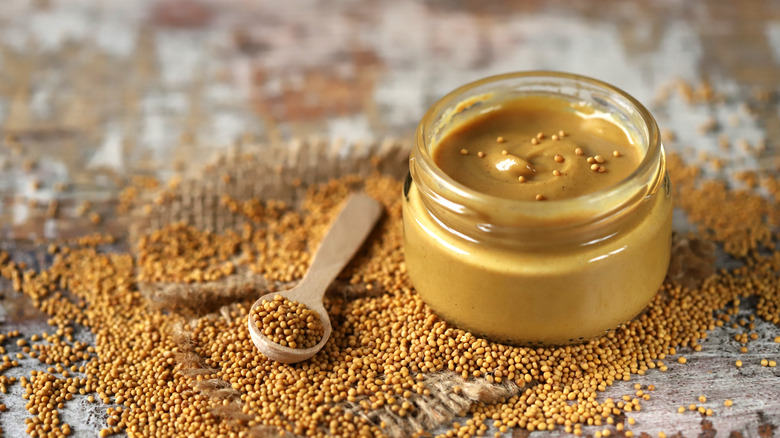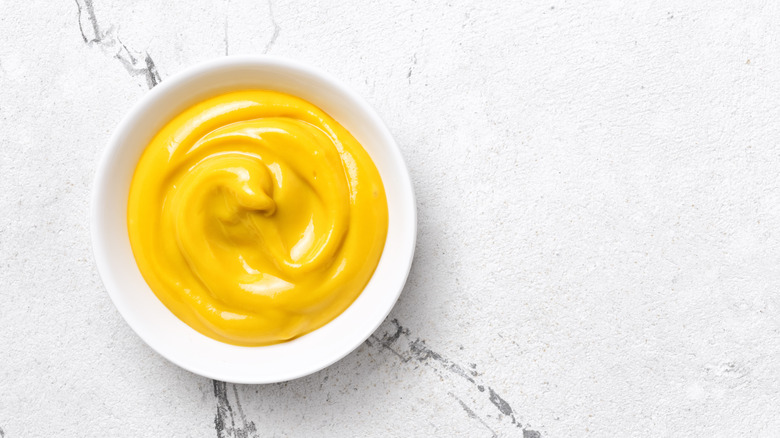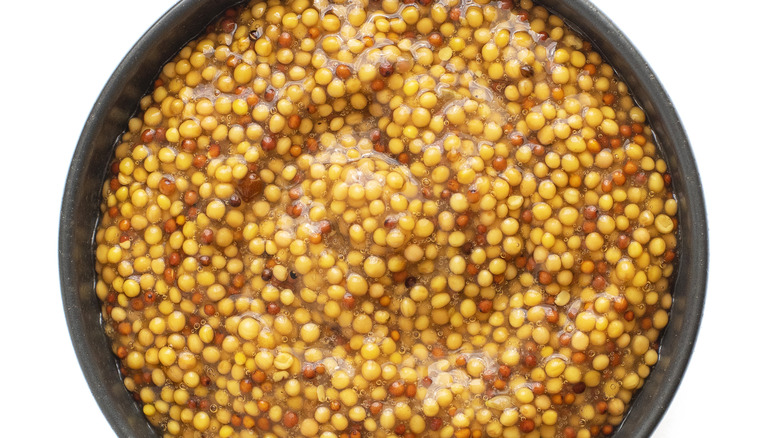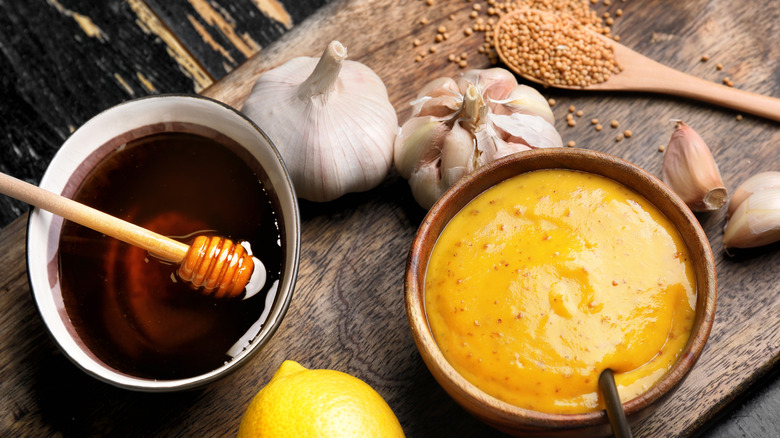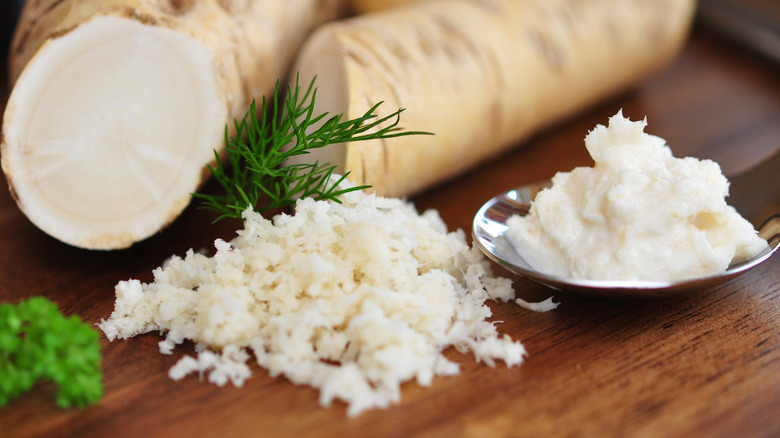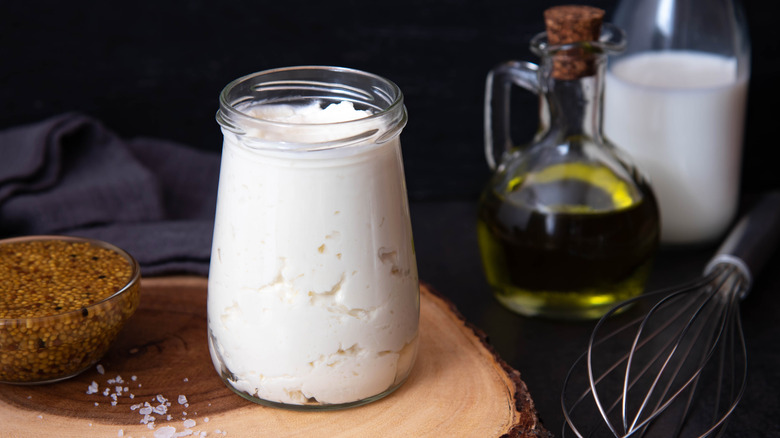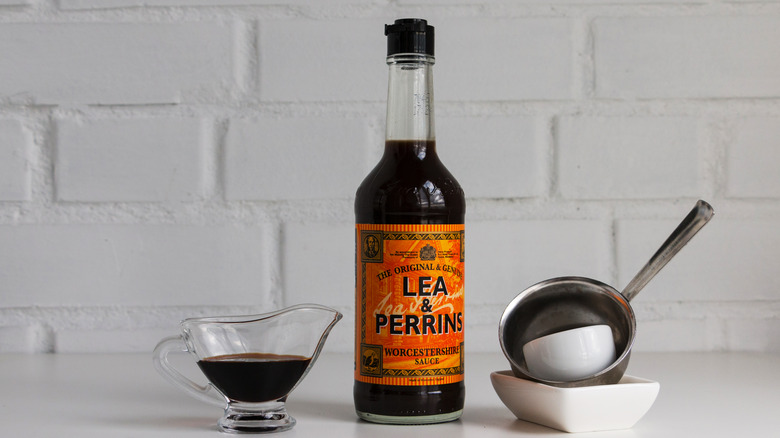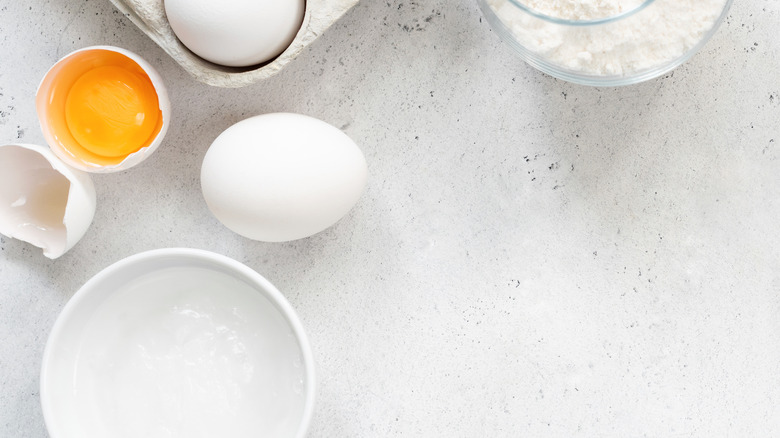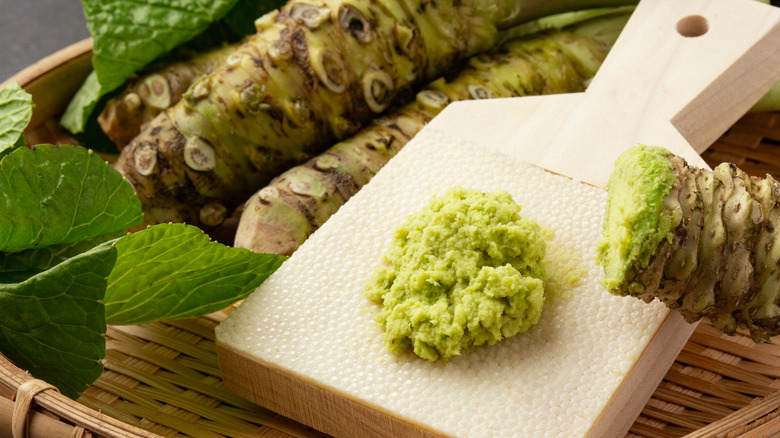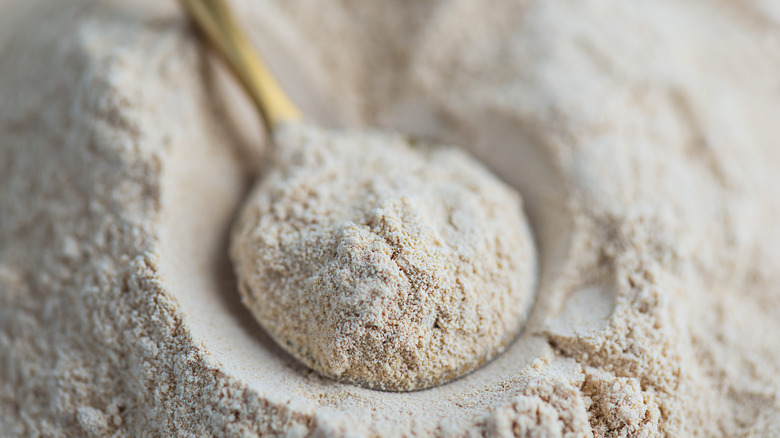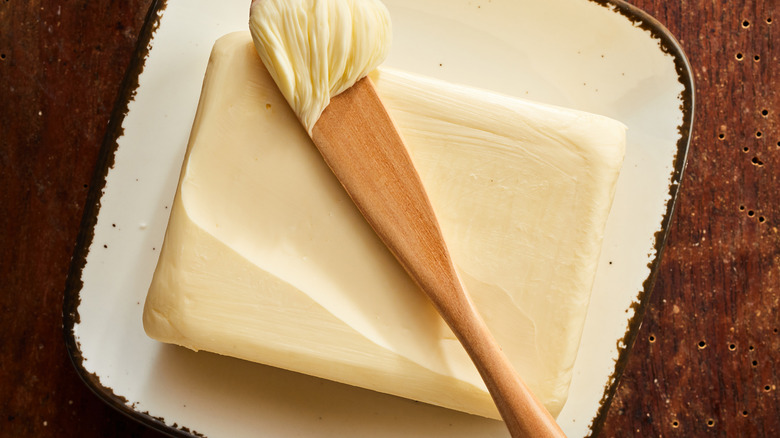10 Best Substitutes For Dijon Mustard
We may receive a commission on purchases made from links.
Whether spread onto sliced bread for a ham and cheese sandwich, mixed into a sauce for a delightful potato salad, used as a marinade for chicken meat, added to a dressing for thickness and flavor, whisked into deviled eggs, or in dozens of other applications, Dijon mustard is a classic condiment that belongs in every kitchen. Depending on the brand and variety of Dijon you choose, this mustard can be spicy and potent with genuine bite, it can be sweet, mild, and tangy, or it can be somewhere in between. In most cases, Dijon mustard will have notes of white wine and vinegar, a bit of pepper, and a bit of saltiness.
Dijon mustard is named for the French city of Dijon, the capital of Côte d'Or département and of the Bourgogne—Franche-Comté région (via Britannica) of east-central France. Mustard has been made there since at least the 13th Century BCE, according to G.S. Dunn. "The origin of the word mustard is believed to have come from the word Mosto or grape muss, a young unfermented wine which was mixed with ground Mustard seeds by the French Monks."
However, unlike many foods and beverages named for a location, Dijon mustard is not considered a protected designation of origin food. As explained in ScienceDirect: "Protected designation of origin (PDO) is the name of a geographical region or specific area that is recognized by official rules to produce certain foods with special characteristics related to location. The PDO regulation covers agricultural products and foodstuffs that are produced, processed, and prepared in a given geographical area using recognized know-how in this specific zone." Champagne is perhaps the best known PDO product, for reference, and while Dijon, France, is still a major producer of this mustard, it is not the only place it can be made, and indeed much of the mustard seed used to produce French Dijon mustard comes from Canada, the world's largest producer of mustard seeds (via Eat North).
If you find yourself fresh out of this fine mustard and without time for a trip to the store, not to worry. Here are 10 suitable substitutes for Dijon mustard.
1. Yellow Mustard
Arguably the best choice as a best substitute for Dijon mustard, yellow mustard is an obvious pick when a sub is needed. Most yellow mustards have a consistency that is rather consistent with that of Dijon, though a dollop of added mayo can achieve a better creaminess when needed (via Richard Pantry). While yellow mustard may lack the spice and nuance of Dijon, these too can be compensated for, to some extent, with addition of a bit of pepper and a dash of white vinegar.
All told, while a basic yellow mustard has no business replacing your Dijon (and in many cases the same is true the other way around — there are absolutely many times when yellow mustard is the better choice), it's a fine substitute in a pinch, especially when a recipe or dish does not call for a large amount of a mustard in the first place.
2. Spicy Brown Mustard
Probably not much of a surprise that yet another good option to use in place of Dijon mustard is yet another kind of mustard, and in this case the kind of called Spicy Brown Mustard, and that usually features whole or only partially ground mustard seeds (via Chef's Pencil). Because of the presence of these larger seeds, this type of mustard has a distinctly different feel on the tongue and teeth than does creamier Dijon, and as such it may not work for all replacements, such as in sauces or for dressings.
However, in terms of taste, a brown mustard often has much the same spice as Dijon and can be a very good stand-in. Just note how much kick the variety you are using has and reduce the volume as needed to compensate down, or else add in some mayo to take the edge off the spice and to add that creaminess, too.
3. Honey Mustard
In terms of texture and taste, honey mustard is distinct from Dijon, but not so much that it can't be used as a stand-in, and certainly not so much that it can't be tweaked to work quite well as such. The milder, sweeter taste of this type of mustard as compared to Dijon (via Spoon University) can be altered with the addition of a bit of horseradish sauce, which can thicken the honey mustard and give it the bite you expect from Dijon. Such an addition is important when the mustard flavor will be prominent, such as in a potato salad.
For swapping out a teaspoon or tablespoon of Dijon to use on a sandwich or in a sauce, you can go ahead and use an equal amount of honey mustard without changing anything else. Yes, your food will be a bit sweeter and milder, but it will all work out fine.
4. Horseradish Sauce
Made from the ground root of the horseradish plant mixed with some salt and vinegar, horseradish sauce is a great stand-in for Dijon mustard in many recipes, and even an advisable choice when you have Dijon on hand if you like spicy foods. In terms of texture, a good horseradish sauce is often quite comparable to a Dijon mustard with no need to compensate for any consistency differences (via Chef's Pencil).
In terms of taste, horseradish sauce is much spicier than Dijon, and it does not have that mustard seed presence, of course, so you need to reserve this substitution when Dijon is being used more for its kick than its prevailing flavor. However, blending horseradish sauce with a milder mustard, like a yellow mustard or even better, a honey mustard, can make a very good stand-in for Dijon mustard when no Dijon is close at hand.
5. Mayonnaise
If you go with a classic take on mayonnaise, which is to say one without flavoring, the mayo will be a near perfect substitute for Dijon mustard in terms of texture, but it will be a relatively meek choice in terms of flavor (via Chef's Pencil). Mayo has a rich, creamy presence, but really does not have much flavor, instead serving to bolster other flavors used in a dish (or sandwich or sauce and so on). However, mayonnaise will readily take on flavors, so you can add some pepper, a bit of vinegar, and some ground mustard powder to concoct a great take on Dijon, using mayo as the base.
And, by the way, if you thought all mayonnaise was egg based, think again. Mayo can be completely vegan, with avocado oil (via Amazon) or various vegetable oils or other non-animal products as the base, so don't shy from it even if you follow a vegetarian or vegan diet.
6. Worcestershire Sauce
First off, for the record, it is spelled "Worcestershire Sauce," but pronounced like this: Wuss-tuh-sure sauce. No, it doesn't make sense how you say it. But it does make sense to use this sauce as a replacement for Dijon mustard in some recipes if needed. It has a very specific flavor that is more of a complement to Dijon than an ape for it, but provided you can thicken your Worcestershire Sauce some, ideally with mayo, it will be suitable in that it has a tang and savoriness akin to that of the famed French mustard.
Just note that while a good stand-in for uses such as in a meat marinade or certain dressings, it's not going to serve all that well on, say, a turkey sandwich or for use in an egg salad, so keep this one as a backup for your backups in most cases.
7. Egg Whites
According to Spoon University, egg whites can actually make a great stand-in for Dijon mustard in many recipes wherein the mustard was primarily playing the role of a thickening agent, and especially when the mustard was there to help ingredients that often avoid one another to blend — oils and vinegars, we're looking at you here.
Of course eggs whites add little appreciable flavor at all, so you'll need to compensate there, and they are not safe to eat raw, thus should only be used when a dish will be cooked. Those caveats noted, using egg whites in place of Dijon mustard when needed means a decent dose of lean protein added to your recipe, and that's always a good thing, given how much of the stuff your body needs every single day.
8. Wasabi
In terms of spice and heat, a good, strong mustard and regular sushi companion, wasabi, have a similar characteristic: Their burn is intense but brief, searing the tongue and nasal cavities but quickly burning out, so to speak, without the lingering intensity that you can get with hot sauce or hot peppers. That said, the intensity of the spice of wasabi is much more pronounced than with Dijon mustard, so if you are using this potent green paste in its place, use a lot less (via Richard Pantry).
As with many other Dijon mustard substitutes on this list, you will do best to blend wasabi with mayonnaise if you want to create a sub that has a similar texture and that is not quite so spicy, yet still has an edge to it.
9. Lecithin Powder
According to The Eat Down, "Lecithin is a protein that helps bind and emulsify oil and water and is found in egg yolk." When mixed with water or another fluid, it can be used to create a substance that will have much the same feel as Dijon mustard and that will act the same in many recipes as well.
That said, it will have none of the flavor of the popular mustard, so if you want the taste (which of course you do) you will also need to add some ingredients like ground mustard powder, salt, vinegar, and maybe some black pepper for a bit of heat, too. Lecithin powder is a good choice for people who are without Dijon mustard and who don't eat eggs for dietary or personal reasons, as it is a 100% vegan foodstuff.
10. Butter
A whipped butter, softened to room temperature, can be used as a decent stand-in for Dijon mustard, provided you can add some spice and flavor yourself. Stir in some ground mustard powder or mustard seeds, a bit of salt, a pinch of pepper, a dash of white vinegar, and a bit of white wine and a good butter can even make a great substitute for Dijon mustard.
And by the way, the secret to so many sandwiches served in Europe tasting so good is simply buttering the bread in addition to standard sandwich ingredients (via Epicurious), so consider using a bit of butter on a sandwich even if you do have some Dijon mustard you can use. It won't make anything healthier, but it sure will add some delightful flavor.
